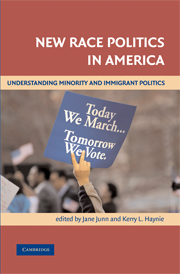Book contents
- Frontmatter
- Contents
- Contributors
- Acknowledgments
- 1 New Race Politics: The Changing Face of the American Electoral Landscape
- 2 In Whose Interest? Political Parties, Context, and the Incorporation of Immigrants
- 3 Beyond Black and White: The Experiences and Effects of Economic Status among Racial and Ethnic Minorities
- 4 Activity amid Diversity: Asian American Political Participation
- 5 Get Me to the Polls on Time: Coethnic Mobilization and Latino Turnout
- 6 Se Habla Espanol: Ethnic Campaign Strategies and Latino Voting Behavior
- 7 Structuring Group Activism: A Macro Model of Black Participation
- 8 Black Elites and Latino Immigrant Relations in a Southern City: Do Black Elites and the Black Masses Agree?
- 9 Understanding the New Race Politics: Conclusions and Challenges
- References
- Index
2 - In Whose Interest? Political Parties, Context, and the Incorporation of Immigrants
Published online by Cambridge University Press: 05 September 2012
- Frontmatter
- Contents
- Contributors
- Acknowledgments
- 1 New Race Politics: The Changing Face of the American Electoral Landscape
- 2 In Whose Interest? Political Parties, Context, and the Incorporation of Immigrants
- 3 Beyond Black and White: The Experiences and Effects of Economic Status among Racial and Ethnic Minorities
- 4 Activity amid Diversity: Asian American Political Participation
- 5 Get Me to the Polls on Time: Coethnic Mobilization and Latino Turnout
- 6 Se Habla Espanol: Ethnic Campaign Strategies and Latino Voting Behavior
- 7 Structuring Group Activism: A Macro Model of Black Participation
- 8 Black Elites and Latino Immigrant Relations in a Southern City: Do Black Elites and the Black Masses Agree?
- 9 Understanding the New Race Politics: Conclusions and Challenges
- References
- Index
Summary
The inclusion of immigrants in the American political system has been a subject of contention throughout American history. In the mid-nineteenth century, the anti-immigrant, anti-Catholic Know-Nothing party became popular for its support of nativist policies, such as prohibiting immigrants from holding public office and increasing the length of the waiting period before U.S. citizenship could be obtained. Although there is no direct contemporary analog to the “Know-Nothings,” the questions of how immigrants are included or excluded, the definition of their roles in the political system, and the potential for political change from the addition of large new groups of citizens remain salient today as the size of the immigrant population in the United States continues to grow. Indeed, contemporary debate on issues such as guest worker programs, access of immigrants to social services, and voting rights for non-citizens in New York City and elsewhere testifies to the persistent importance of issues surrounding immigration and naturalization.
Political parties are often identified as the driving force behind immigrant political incorporation in the United States, a perception fortified by the widespread image of early-twentieth-century machine politicians trading food baskets and patronage for votes in Irish and Italian immigrant communities. An important function of political parties is to mobilize mass publics, but their overriding goal is to win elections, and parties will attempt to activate voters only when it is in their interest to do so.
- Type
- Chapter
- Information
- New Race Politics in AmericaUnderstanding Minority and Immigrant Politics, pp. 17 - 38Publisher: Cambridge University PressPrint publication year: 2008
- 6
- Cited by



